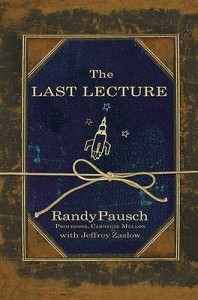This book is difficult to talk about.
We live in a culture that deals poorly with death. We live in a culture that does not know how to approach those with terminal illness and does not know entirely how to talk in healthy ways about death. It is healthy to grieve. It is normal to feel loss. And I cannot fathom how it must feel to receive a terminal diagnosis or have the love of my life receive a terminal diagnosis. So then, as someone who reads and reviews books with no experience with terminal illnesses, who am I to critically give my opinions on The Last Lecture? His last big philosophical look at life to the world, to his children. This book was not even written for me.
This fact makes it hard for me to talk genuinely about the content of the book and share any form of criticism even if it is the most positive criticism imaginable. I do not know Randy or his family. From his life advice and life stories, I would like to think he is one to take feedback and use it to become better. I want to say upfront, I have the utmost respect for Randy Pausch and his family. It is difficult to stand in the face of a terminal illness and share to the world pieces of his life. I will go about this review respectfully, sharing my opinions from a social justice lens.
Writing Style
Randy has almost a haphazard way of writing. He comes from a technical background but I definitely get the feel of Randy in his home life – spreading cloths around the room and items around the bathroom. Like his wife Jai, it drives me up the wall! Usually I do not enjoy sporadic writers, but in this case, it provided a strong structure (a little counter intuitive) for Randy to share anecdotes often ending with life lessons made up of profound philosophical cliches. I did find the book emotionally overwhelming at times (more in the below section) and the short chapters helped me space out my experience with The Last Lecture. I feel Randy conveyed a piece of himself in the writing. I felt his arrogance, his scientific approach, his messiness, his optimism (Go Tigger!), his love for his family, and his need to leave a legacy for his children.
Story
The story in The Last Lecture is an emotional ball: celebrating of life, facing depression and overwhelming grief, worrying about the future of a family, and trying to think about the legacy that will be left. I read the book fairly quickly but I had to take breaks to process Randy’s life advice and the emotional impact of what has happening.
I stopped every now and then and thought about what if I received a diagnosis of a terminal illness? What if my wonderful partner received a diagnosis of a terminal illness? How would I react? How would we react? What would become the most important thing in our lives? Why isn’t it the most important thing right now? Many may consider this morbid thinking but the reality is we all have to face declining health and death at some point in our lives of ourselves or our loved ones. I do not think we can fully prepare for these life changing events, but as I said in my introduction, I think it is important to develop a healthy sense of death, the time we have here, and importance of different things.
Social Justice Impact
Randy does a good job early in the book addressing that he won “the parent lottery.” But he won more than the parent lottery, he won the identity lottery: White, middle class, heterosexual, of a Christian-based faith, and able-bodied until the terminal diagnosis. The mere fact he was able to share his last lecture with his institution, with the world, is privilege in itself. Many folks are diagnosed with a terminal illness and many more people who pass away “before their time” do not get the opportunity to share their story.
I truly appreciate the advice Randy gives the reader and his children. And I noticed a lot of his advice are rooted in privileged experiences. One example that comes to mind is his mantra about achieving childhood dreams. I love hearing about childhood dreams and dreams in general and will work with individuals around achieving those dreams. But not everyone has the luxury of pursuing their dreams or even the means to complete those dreams in their lifetime. Access to opportunities and the resources needed to achieve dreams are based a lot on social identity and the socioeconomic status and education level of parents/guardians. The American Dream, pulling yourself up by your bootstraps, is a myth to many people in the US. In Randy’s case, one of his big dreams was to work as a Disney Imagineer. He ended up cold-emailing someone at Disney who agreed to meet with him and gave him an opportunity to work with the Imagineers. Besides the resources and opportunities to get the qualifications needed to work as an Imagineer, not everyone, particularly women and people of color, have the capital to request meetings out of the blue and are graciously accepted.
By no means am I saying Randy’s experiences and life lessons are not inspiring, because they are. I think we need to take people’s experiences with a grain of salt, recognizing how systems of privilege and oppression impact what certain people can achieve in our country. I think his advice is transferable – I do not need as much money as Randy, I do not need the connections Randy had, but I can take his advice and apply it to my own experience.
Discussion
No comments yet.